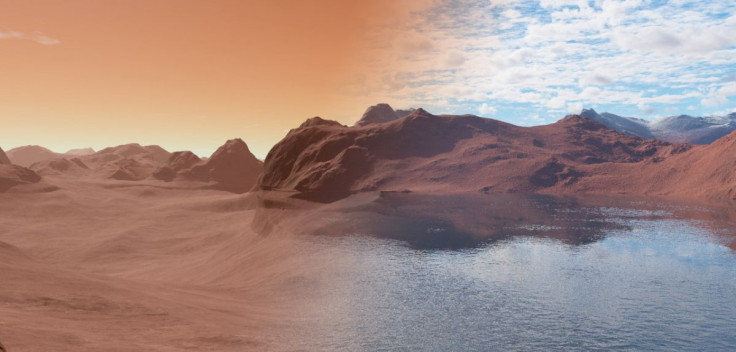How Did Water On Mars Disappear? Blame Spongy Rocks, Scientists Say

Our efforts to put humans on Mars has been gathering steam. Big private space technology companies have been gearing up efforts to reach deep space of which Mars will be the first stop. Elon Musk, CEO of SpaceX, along with several other private superpowers like Virgin Galactic and Blur Origin have ramped up their efforts to be the ones to make this possible.
But, along the way we are making some fascinating findings about our red neighbor that could help us understand it better before we head there. Now, scientists from Oxford's Department of Earth Sciences have published a study that said water on Mars did not evaporate or just disappear but is hiding in the rocks.
The discussion of Mars’s life holding capacity often starts with whether the planet has water. Since we found the first signs of ice and established that Mars could have held frozen or liquid water in the past, we have been trying to figure out where it all went.
New research published in the journal Nature suggests that the Martian surface acted like a sponge and absorbed all the flowing water on Mars, causing rocks to oxidize and give the planet the barren landscape we now see.
Previous research by the team pointed to a collapse in the magnetic field in the red planet’s past which resulted in the loss of water to space. They thought high-intensity solar winds could have carried the water away or it could just be laying low in as an icy core.
The team looked to study if the rocks on Mars absorbed water like on Earth and also analyze the role of the Martian surface in the eventual disappearance of water from the planet.
The team assessed the role rock temperature, sub-surface pressure, and general Martian make-up, have on the planetary surfaces.
The results revealed that the basalt rocks found on Mars can hold approximately 25 percent more water than rocks on Earth. This, as a result, drew the water from the Martian surface into its interior.
“People have thought about this question for a long time, but never tested the theory of the water being absorbed as a result of simple rock reactions. There are pockets of evidence that together, leads us to believe that a different reaction is needed to oxidize the Martian mantle. For instance, Martian meteorites are chemically reduced compared to the surface rocks, and compositionally look very different. One reason for this, and why Mars lost all of its water, could be in its mineralogy,” said Jon Wade, NERC Research Fellow in Oxford's Department of Earth Sciences. He was also the lead author of the study.
The basaltic crust on Mars was formed by water reacting with the freshly erupted lava. This resulted in the rocks absorbing the water, which reacted with the rocks to form a variety of water-bearing minerals.
“Mars is much smaller than Earth, with a different temperature profile and higher iron content of its silicate mantle. These are only subtle distinctions but they cause significant effects that, over time, add up. They made the surface of Mars more prone to reaction with surface water and able to form minerals that contain water. Because of these factors the planet's geological chemistry naturally drags water down into the mantle, whereas on early Earth hydrated rocks tended to float until they dehydrate,” he said in a press release on the University of Oxford website.
The team showed that studying the chemical composition of a planet is essential in determining the future and past of the planet. The study of minerals present in rocks shows us the slow chemical reactions the planet underwent during evolution.
These reactions could indicate that the planet went through certain processes over time and serve as documentation of a changong topography. The same way we study evolution of Earth, these scientists are trying to establish with certainity, the progres in the red planet's history that made it what it is now.
Our hopes of a future civilization after depletion of Earth's natural resources rest on Mars. Gathering new information for the first missions there will be crucial in our survival.
© Copyright IBTimes 2024. All rights reserved.




















